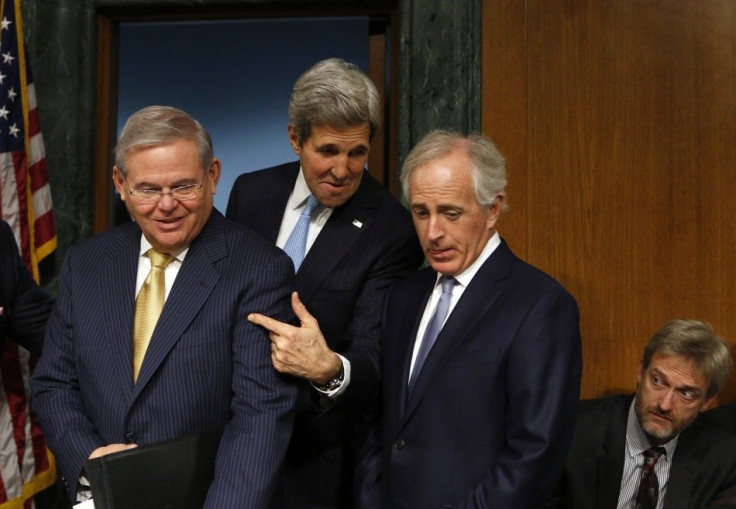US Asks Iran To “Compromise” For Clinching Nuclear Deal: Defected Iran Journalist Alleges US Team Is Pro-Iran

The United States has put the onus on Iran to clinch a nuclear deal by making suitable compromises. The talks between Iran and the U.S. with a March 31 deadline have been in progress at Lousanne, Switzerland. But concerns are also out that the U.S is reportedly caving into the pressure of Iran for making progress in the deal. Iran is reportedly very stubborn on all its demands.
An Iranian journalist, who sought political asylum in Switzerland on Friday, and was covering the nuclear talks, alleged that the U.S. team is behaving like purveyors of Iran’s point of view to other countries, in its eagerness to clinch the deal.
"We are working hard," Secretary of State John Kerry told CNN and added there is progress “but we are not there yet.” Iranian Foreign Minister Mohammad Javad Zarif said "Things are going, it's tough," after a meeting with Kerry. Still, both sides are optimistic that an agreement can be reached. The six-power group comprises Britain, China, France, Germany, Russia and the United States.
The nuclear accord with Iran envisages a quid pro quo, by which Tehran must halt its sensitive nuclear work for a decade. If that is done, it will be rewarded for the restraint by lifting some of the U.N. sanctions. That will allow Iran to come out of the 12-year nuclear standoff with the West and reduce the risk of a war in the Middle East. However, the U.N. arms embargo on Iran would not be lifted in the initial phase despite any deal, given the volatile situation in the region.
French foreign minister Laurent Fabius echoed the views of the West and called for stringent limits on future Iranian nuclear activity, if the deal has to be supported by France. “The important thing is the content not the deadline," Fabius told reporters in New York.
The United States and European partners are against allowing Iran to operate centrifuges at the Fordow underground site. In November 2014, an Iranian government website claimed that Washington will allow it to keep some 6,000 early-generation centrifuges, down from nearly 10,000 now in operation.
Iran’s Intransigence
Despite progress, major areas of disagreements in the nuclear talks are Tehran’s insistence to continue research on advanced centrifuges at its underground Fordow site. According to a senior Iranian official, disputes are lingering over two issues of R&D and U.N. sanctions. Iran says the other side comprising six nations is not flexible. In the run up to political framework of the agreement, the U.S. and European delegations want more specifics, including real time figures for permissible centrifuges that Tehran could operate and the volume of uranium stockpiles it can keep besides clarity on other technical issues. The six powers want curbs on the most sensitive aspects of Iran's nuclear program for at least a decade followed by years of strict U.N. inspections. They also want to make sure Tehran needs at least one year to produce enough enriched uranium for a weapon, in case the Iranians decide to do so. But Iran says it has no nuclear weapon ambitions.
Israeli Concerns
Meanwhile Free Beacon reported that the fears raised by Israel that the Obama administration will be succumbing to Iran’s stubborn demands, are almost coming true. It said the U.S. negotiators are giving up ground on many stated positions. One is the retreat from the demand that Iran must disclose the full range of its nuclear activities at the outset of a nuclear deal. Barring that, the promised “verification as the crux” of the deal with Iran will look hollow. Another big concern is yielding to Iran’s demand to run its nuclear centrifuges from an underground site. Such concessions will ultimately allow Iran to work on its nuclear weapons program unimpeded by the gaze of international inspectors.
The retreat of the U.S. from its strong positions has been criticised by nuclear experts including David Albright, who is the president of Institute for Science and International Security. Albright told U.S Congress that a prerequisite for any comprehensive agreement is for the IAEA to know when Iran sought nuclear weapons, how far it got, what types it sought to develop, and how and where it did this work. Also, the IAEA needs a good baseline of Iran’s military nuclear activities, including the manufacturing of equipment for the program and any weaponisation related studies, equipment and locations.
US Team “Pro-Iran”
Meanwhile, Amir Hossein Motaghi, a close media aide to Iran’s president Hassan Rouhani, defected and sought political asylum in Switzerland after travelling to Lausanne to cover the nuclear talks between Tehran and the West, reports The Telegraph. He reportedly resigned from his job at the Iran Student Correspondents Association and later appeared on an opposition television channel in London on Friday, to announce his plans. He said he saw no “sense” in his profession as a journalist, as he can only write what has been told. In a television interview, Mottaghi alleged that the U.S. negotiating team is basically doing Iran’s bidding and they are “mainly there to speak on Iran’s behalf with other members of the 5+1 countries and convince them of a deal.”
(For feedback/comments, contact the writer at kalyanaussie@gmail.com)





















